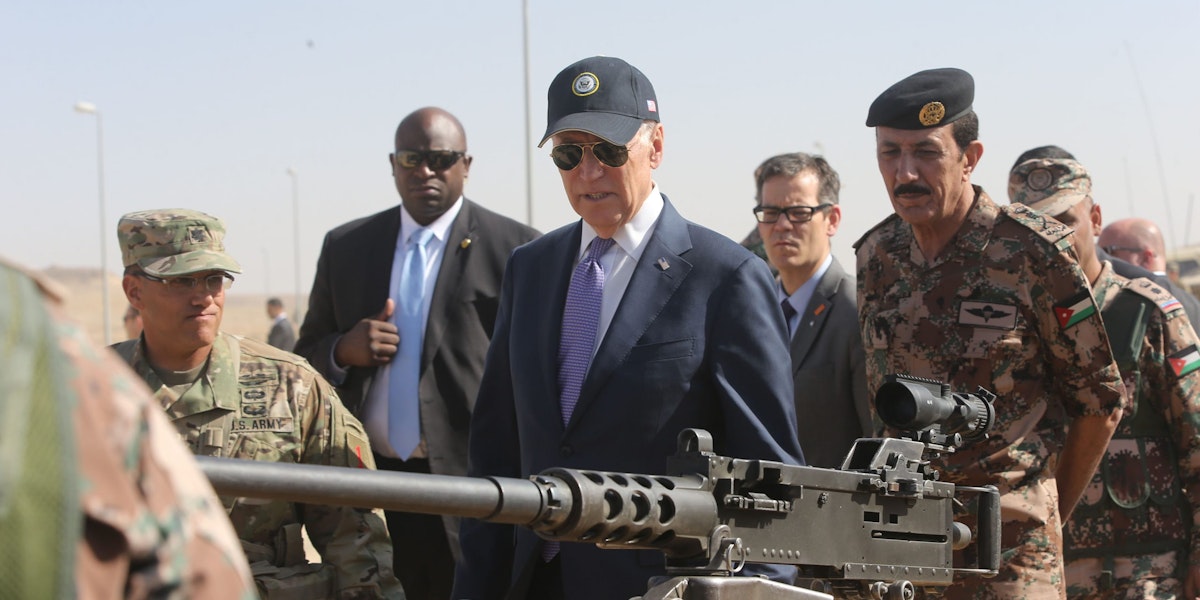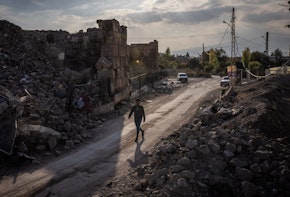President Joe Biden has promised to avoid distractions and focus on America’s biggest priorities, raising the question of whether he wants to disinvest in the Middle East. He has also promised to shift from military to civilian tools of engagement, which creates worthwhile but difficult problems of how to effectively deploy diplomacy in a region rife with violent conflict. He has staffed his national security bureaucracy with experienced hands, most with long periods of service in the Obama administration.
Does the preponderance of Obama administration alums suggest a return to the policies of 2009–16? Can a more professional, less militarized U.S. policy, with more realistic strategic goals and a core of democratic values help stabilize the Middle East and reduce the region’s endemic human suffering? What are the specific new policies that Biden can bring to bear on the region’s many crisis points—and how likely are they to produce significant change given the many drivers of conflict in the region?

Matching Ends and Means in Syria
Aron Lund
The United States has been involved with the Syrian war since it began ten years ago, with American troops in the country since 2014. But even though Washington has lavished money, attention, and high explosives on this war-torn country over a full decade, it has never produced a credible plan with plausible goals, matching ends with means.
President Biden has signaled that he wants to downsize U.S. involvement in the Middle East and refocus on national security priorities such as Russia and China. In Syria, however, the United States is already involved, currently operating on Trump-era policies that seem both unsustainable and at odds with Biden’s own declared priorities. It might be tempting for an administration packed with former Obama-ites to simply revert to a pre-Trump posture, but that won’t be possible—the conflict has changed too much since 2016. Obama’s Syria strategy was confused and counterproductive at the time, and it is an anachronism now.
Ultimately, Biden will be forced to come up with an idea of his own about what the United States is doing in Syria, how it intends to get that thing done, and whether he plans to hand the conflict off to his successor or not.
He doesn’t have much to work with. Under Trump, Syria strategy zig-zagged under the stewardship of feuding officials intent on filling the policymaking void with their own ideas while they dodged rare bursts of presidential attention. By the end of Trump’s four years, he had decided to pull out of Syria on three occasions, only to backtrack each time and hand the reins back to underlings for whom it was imperative that the United States should stay in Syria forever.
In so far as the chaos of the Trump years left the United States with any Syria strategy at all, it was as an adjunct of the “maximum pressure” campaign against Iran, Assad’s ally. The U.S. military deployments at Tanf and in northeast Syria, which were originally conceived to fight the Islamic State, were reimagined by the Trump team as part of a policy of economic strangulation, which also included financial sanctions, efforts to drain or divert Syria’s fuel supply, and the obstruction of trade with regional countries.
In trying to crack the Syrian economy, the White House received unexpected assistance from a bank crash in nearby Lebanon and from the COVID-19 pandemic, which combined in early 2020 to devastating effect. The value of the Syrian currency has fallen precipitously since then, imploding local salaries, and there are shortages of fuel and even bread. The UN’s World Food Programme warned last year that Syria might face a “famine” and recently stated that a record-breaking 12.4 million Syrians now lack regular access to food.
However, Assad does not seem to suffer and his behavior has not changed. In spite of the Trump policy’s stated motivations, Assad’s close ties to Iran—his economic lifeline—remain as robust as ever, and the growing hunger among his subjects does not seem to have stimulated the dictator’s interest in reform.
As Syria atrophies socially and institutionally, the pro-Assad camp is likely to grow increasingly dysfunctional, desperate, and unpredictable.
That is not to say that continued U.S. economic warfare would leave Assad’s regime unscathed. As Syria atrophies socially and institutionally, the pro-Assad camp is likely to grow increasingly dysfunctional, desperate, and unpredictable. Syrian, Russian, and Iranian pushback against the U.S. presence is likely to intensify, but we may also see widening cracks within the ruling elite and perhaps a crumbling of regime control in peripheral areas, potentially rekindling conflict of a higher order.
What isn’t clear is whether that is what Biden wants. And if so, to what end, in support of which other actor, and at what cost?
These are fundamental questions that may or may not have good answers. But they have yet to be properly posed, let alone discussed, in a Syria debate so clouded with hazy notions of “leverage” and “transition” that it is impossible to make out the road ahead.

Right-Sizing America’s Role, Starting in Iraq
Sajad Jiyad
The Middle East as a whole no longer carries significant strategic interest for the United States, something both Presidents Obama and Trump agreed on. President Biden appears to share the same view and is in a better position to follow through on pivoting to other regions. The first weeks of the administration have sent out that signal that the Middle East is no longer a priority for U.S. foreign policy.
Despite the likely strategic shift by the White House, Iraq may still hold some importance. President Biden prioritized a call with Iraqi Prime Minister Mustafa Al-Kadhimi ahead of other leaders in the Middle East and there is an understanding that Iraq’s situation is tied to Iran. While the United States still has troops stationed in Iraq, the counter-ISIS effort is on a trajectory to winding down. The United States will continue to be involved in supporting Iraq militarily, with an expanded NATO mission being one avenue for shifting away from the U.S.-led coalition. The chaotic situation in Iraq makes American military power a blunt instrument and the Biden administration is right to want to extricate forces, given that the threat of violence and conflict is so high and the reward so little.
The chaotic situation in Iraq makes American military power a blunt instrument and the Biden administration is right to want to extricate forces.
But it would be unwise for Washington to completely abandon Iraq, despite the limits on what the United States can accomplish there. Firstly, Iraq is on the verge of an economic collapse, which will bring about a political and security collapse as well. The fallout will impact U.S. interests throughout the Middle East and potentially strengthen terrorist and militia groups that can operate across borders. Second, without a region-wide settlement on security (and absent U.S. leadership), tensions between Iran and other countries will remain, with a weak, unstable Iraq the perfect venue for proxy wars. So even if the United States negotiates a return to the Iranian nuclear deal (the Joint Comprehensive Plan of Action, or JCPOA), this will not lead directly to a calmer Middle East. Third, if the United States has recognized China and Russia as a strategic threat, then allowing them to increase influence in countries such as Syria and Iraq after U.S. disengagement would seem short-sighted and self-defeating. Some American involvement in Iraq makes sense, at a minimum as a hedge to thwart the competition.
The best way forward tracks with Biden’s interest in diplomacy: a return to smart power, using tools and policies to influence Iraq and the region through means other than the military. One way is to hold governments to account for their human rights abuses and bring pressure to bear that effects a sustainable change in behavior. This approach would require the administration to be engaged and use all the tools at its disposal while correcting formerly cozy U.S. relationships with dictators and violent regimes. Another effective strategy would be to support younger generations in target nations to be more creative, more capable, and better equipped to organize, inspire, and lead reforms and change in their countries. People-to-people programs—such as technology and economic innovation initiatives—leverage American strengths. Such programs might not be as flashy as military aid, but cost less, sidestep scletoric governments, and have a chance at lasting societal change.

Obama Alumni Have Wisely Low Expectations
Sam Heller
I’m cautiously optimistic about a Biden administration populated largely with Obama alumni, mainly because I suspect the Biden team’s outlook on the Middle East will be more Obama 2016 than Obama 2009.
Barack Obama arrived in the White House in 2009 aspiring to a “new beginning” with the Arab and Muslim world, after his predecessor George W. Bush’s catastrophic tenure. The Obama administration was then confronted with 2011’s Arab uprisings, which seemed to promise a new beginning of their own for the Middle East’s regional order. The possibilities for radical positive change appeared unlimited.
Faced with this complex and rapidly evolving policy challenge, Obama’s team made some bad choices. So did others. And that initial surge of protest and reformist energy region-wide mostly turned into authoritarian revanchism, bloodshed, and destruction.
By the time Obama left office in 2017, I think administration staffers had been disabused of their 2011 optimism. I doubt that Obama alumni now making their return to government have forgotten the experience.
As Biden officials now revisit files such as Syria, I don’t think they’ll see many potential policy wins or be particularly energized to deepen America’s involvement. Early on, advocates for renewed U.S. interventionism seized enthusiastically on remarks by Secretary of State Antony Blinken, in which he described Syria as one of the Obama administration’s great failures. They seem to have assumed that these expressions of regret translated into a present-day commitment to activist policy. But that type of retrospective critique doesn’t necessarily mean that Blinken and other Obama veterans see 2021 as a chance for some sort of do-over, presenting the kind of opportunity and potential that 2011 did. Rather, these Obama alumni may just appreciate the scale of the wreckage they helped leave in the region, and with which they are again faced.
The Biden White House doesn’t seem to share the Trump administration’s obsession with crushing Iran.
Importantly, the Biden White House doesn’t seem to share the Trump administration’s obsession with crushing Iran—another aspirational project to remake the region that was like a cracked-mirror version of Obama-era idealism.
I think that a Biden team that’s a little more jaundiced about what America can achieve in the Middle East is probably better for U.S. policy, and for the region’s people. There’s still important work to be done, from re-solidifying the U.S.–Iraqi relationship to helping stave off Lebanon’s total collapse. I’m hoping that Obama alumni and other veteran officials who remember how unhappily things ended last time will be prepared to handle these files now in a way that’s a little more grounded and realistic.

Don’t Back Down with Israel
Dahlia Scheindlin
The Biden administration faces two main challenges regarding Israel and Palestine: ending Israel’s role as spoiler in American diplomacy with Iran, and reviving the path to Israeli–Palestinian peace.
No matter who wins Israel’s March 23 Israeli elections, both aims are within reach—because both benefit Israel.
America has made a firm decision to re-introduce American diplomacy with Iran; the only question is managing Israel. But the United States need not back down: Israel’s leadership is signaling an opportunity, if the administration knows where to look.
Since Biden’s inauguration, there has been a subtle—even erratic, plausibly deniable—change of discourse emanating from Prime Minister Netanyahu’s direction.
Three days after President Biden’s inauguration, Israeli news reported that Mossad chief Yossi Cohen developed a list of Israeli terms to be included in any agreement with Iran, a notable shift from the near-absence of the word “agreement” other than in denunciation from Israeli security officials roughly since 2015. Days later, the IDF chief of staff reversed the sentiment in a militarist rejectionist speech. Yet on February 25, Israel’s head of the National Security Council reportedly asked the United States to de-couple the issues of halting Iran’s nuclear development and Iranian military activity in the Middle East. This is a turnabout from what analysts have called Israel’s “all or nothing” strategy toward Iran. More surprisingly, unnamed Israeli officials told the media they were “generally satisfied with what they describe as the Biden administration’s constructive approach,” a sentiment unheard of during the Obama era.
Netanyahu is on the defensive and seeking to prove that he can still maintain bipartisan relations with the United States.
Why now? Netanyahu is on the defensive and seeking to prove that he can still maintain bipartisan relations with the United States. Iran’s rush to enrich uranium following America’s exit from the JCPOA may have penetrated both public and policy thinking in Israel. Or perhaps Netanyahu knows that, with a Democratic Congress, he can no longer undermine a Democratic president. In a lengthy television interview, Netanyahu reiterated the two-prong strategy of a military option and tough sanctions, but he is the master of proxy signaling and trial balloons; the administration should seize them.
On the Israeli–Palestinian front, the administration should clarify its intent to act in the present, in ways that strengthen any future political agreement based on equality and self-determination.
Here too there may be an opportunity: after a year of grandstanding about West Bank annexation from 2019–20, Netanyahu forged the Abraham Accords—a convenient exit route offering normalization in exchange for suspending provocation.
The Biden administration can repurpose this strange patrimony left by the Trump administration. Instead of accepting Netanyahu’s argument that Israel can enjoy normalization without resolving the Palestinian issue at all, the United States can follow the quid pro quo spirit expressed recently by the UAE’s ambassador to the United States: normalization for de-escalation.
Seasoned Obama-era diplomats know that coaxing Israeli and Palestinian leaders to negotiations for a twenty-year-old concept of a two-state solution is futile at present.
Instead, the administration should advance steps that will benefit any future agreement. Progress could start with substantive improvements for Palestinian material and economic life, in line with Netanyahu and Trump’s own rhetoric, re-purposed for the goal of rebuilding Palestinian trust in the United States, stabilizing Palestinian society, and deepening economic cooperation between Israel and Palestine, thereby creating an infrastructure for future political agreements. Washington can support Palestinian elections and commit to respect the results if the elections are deemed fair; it can also offer broader support for reviving Palestinian democracy. On aid, the United States can press Israel to provide relief to Gaza, provide win-win assistance on vaccine acquisition and distribution there (and in the West Bank), relax the closure/separation policy when COVID restrictions are over, and boost infrastructure and humanitarian relief. Finally, Washington can encourage new thinking between Israel, Palestine, and the Gulf States about economic and security cooperation, in ways that support future Israeli–Palestinian agreements.
Most importantly, the United States needs to signal to Israel that de facto settlement growth, land grabs, housing tenders, and other incremental Israeli forms of West Bank expansion are tantamount to annexation regardless of Israel’s stated policy—and will be treated as such. The U.S. team must not back down in communicating that the failure of the antiquated two state vision is no reason to accept non-resolution; that the United States is committed to finding an alternate final status political agreement if needed—but will not accept unrestrained Israeli expansionism in perpetuity.

First, Do No Harm
Daphne McCurdy
The Obama administration’s ambivalence about the Middle East typically led to policies that split the difference between decisive military intervention and consistent restraint. Attempts to deprioritize the region without a clear plan, only to have to prioritize it again when chaos erupted on the ground, resulted in the worst of both worlds. The result was policies that implicated the United States and raised expectations but did not have enough leverage to actually shape outcomes.
Fast-forward four years, and much of the rhetoric about deprioritizing the Middle East from the Obama years reverberates, but this time with American alliances shattered and credibility tarnished from the recklessness of the Trump era. Shifting away from the region, however, shouldn’t mean disengaging all together. In fact, a retreat with no strategic rethink would simply maintain an unsustainable status quo. Rather, the Biden administration would be better served by proactively setting narrow, well-defined goals with a real chance of success, which requires reimaging how America does business in the region.
In short, Biden needs a disciplined but principled foreign policy toward the Middle East that reduces U.S. engagements but affirmatively upholds its interests and values when it does engage. An important starting point is a recognition that instability in the region stems from poor and authoritarian governance, and that both U.S. interests and values are served when the United States seeks to address such instability. But equally important is a recognition, rooted in humility, that the United States does not have the ability to transform societies or governments.
The Biden administration should be driven first and foremost by a principle of “do no harm,” pursuing policies that do not further entrench authoritarian governance and setting clear redlines that carry consequences for egregious behavior.
Accordingly, the Biden administration should be driven first and foremost by a principle of “do no harm,” pursuing policies that do not further entrench authoritarian governance and setting clear redlines that carry consequences for egregious behavior. This principle needs to be operationalized in all aspects of our foreign policy—including defense, diplomacy, and development—and should begin with a rebalancing away from defense and toward diplomacy and development.
First, regarding defense: the United States has primarily viewed relationships in the Middle East through a security prism, which has meant costly wars and outdated partnerships that implicate the United States in massive human rights violations. The Biden administration should evaluate the strategic value of its security partnerships based on today’s priorities. It should reduce arms sales to human rights abusers, starting with a shift to the sale of only defensive equipment, and avoid national security waivers to overcome human rights requirements in assistance packages. Terrorism and insurgency will continue to destabilize the region, but a Biden administration should not overstate the threat they pose to U.S. national security. Instead, the United States should continue its current engagements but more thoroughly define success and develop clear withdrawal timelines and troop commitments that are commensurate with these explicitly stated goals.
A serious reorientation requires Biden to deliver the sizable investment in diplomacy that he has promised. Full-throated diplomacy must be the linchpin for addressing all of the challenges in the region. First, the Biden administration should emphasize the importance of legitimate governance in all public and private diplomatic engagements while acknowledging the challenges the United States also faces in this regard. Second, it should prioritize civilian rather than military interlocutors. This will help rebalance civil–military relations and elevate a variety of societal voices, from grassroots movements to business leaders. Third, in conflict zones, the Biden administration should leverage diplomatic tools to de-escalate and optimize the resulting space to pursue humanitarian goals. Finally, it should coordinate better with democratic allies to ease the resource burdens of its efforts and adopt complementary initiatives toward shared objectives in the Middle East.
Development rounds out the foundation of U.S. policy. Prioritizing political and economic development in the region will not necessarily require more investments, but rather the right investments. Too often, assistance dollars are disbursed without fully considering their repercussions on the ground. The end result is often projects that have minimal impact at best, and, at worst, reinforce existing hierarchies and poor governance. For example, the United States should avoid efforts that seek to liberalize economies but end up perpetuating corruption and patronage networks. Similarly, the United States should avoid capacity-building efforts in government ministries where there is no will for substantial reforms. Instead, the Biden administration should strategically invest in key sectors and, more broadly, pivotal countries such as Tunisia, where the host government’s interests are aligned with those of the United States. In countries facing conflict and humanitarian crises, the United States should prioritize improving the aid environment rather than increasing aid to ensure assistance gets to those who need it most. Finally, while democratic space is limited throughout the region, the Biden administration should find opportunities to support small and nimble civil society actors, but only if it is willing to stand up for them politically in the event of repression. These groups are often diffuse and don’t have organizational capacity, but are worth supporting because of their influence on the ground.

Reverse Course on Western Sahara
Amanda Rogers
President Biden faces a host of challenges in the Middle East and North Africa, from Syria’s protracted civil war and Iran’s struggle for regional hegemony to the Palestinian–Israeli conflict and demanding accountability from Saudi Arabia for the assassination of Jamal Khashoggi, among other egregious human rights violations. Of all related issues, however, the Western Sahara provides the most straightforward foreign policy position the president should tackle as he works to undo the previous administration’s disastrous impact on the region. Rarely does the world community demonstrate such widespread consensus on foreign policy questions in this contested region; a move by Biden to reverse Trump’s unilateral recognition of Moroccan sovereignty over the Western Sahara—and, subsequently, support for a U.N.-led referendum on self-rule—would contribute not simply to increased security and stability throughout the Mediterranean, but also demonstrate commitment to the United States’ disavowal of isolationism in favor of multipolar partnerships. Nothing less than a definitive break with Trump’s foreign policy is needed, and the Western Sahara provides the most clear-cut path forward.

Embracing Soft Power
Sima Ghaddar
Despite the focus on individual appointments, it is important to remember that any presidential administration is a vast bureaucratic machine. The choice of personnel can give a hint about policy, but cannot entirely explain it. Several members of Obama’s bureaucracy, for example, disagreed with some of his key foreign policy decisions. The number of Obama administration officials appointed by Biden does not necessarily mean a return to Obama’s Middle East policy. As far as the Middle East is concerned, Biden is bringing back the figure of the humanitarian diplomat, perhaps in the hopes of salvaging America’s tarnished reputation as a human rights defender.
As far as the Middle East is concerned, Biden is bringing back the figure of the humanitarian diplomat, perhaps in the hopes of salvaging America’s tarnished reputation as a human rights defender.
One should look no further than the two Harvard professors Biden picked for director of the U.S. Agency for International Development (USAID), Samantha Power, and deputy secretary of state, Wendy Sherman. Both Power and Sherman signal Biden’s interest in using a combination of soft and hard power.
Soft power was notably neglected during the Trump presidency, which sidelined USAID and threatened to slash its funding multiple times. As Biden’s pick for director of USAID, Samantha Power is likely to use foreign aid and assistance to reassert American soft power and salvage what she describes as America’s tarnished reputation and leadership.
During her years in the Obama administration as the U.S ambassador to the United Nations, Power pushed for the intervention in Libya and was disappointed with Obama’s reluctance to intervene more in the Syrian war, especially after the Syrian government’s 2013 chemical attack. She has been praised for her “nuanced thinking in foreign policy”—for being a humanitarian who is not afraid to call for military intervention on humanitarian grounds. Power covered the Bosnian war as a journalist, and in her 2019 memoir, The Education of an Idealist, she describes her career path as that of an activist who made it to the White House. After serving in the Obama administration, Power came out a stronger opponent to U.S inaction in the face of human rights violations.
Wendy Sherman, Biden’s pick for deputy secretary of state, was the chief negotiator of the Iran Nuclear Deal during the Obama presidency. Sherman is a strong believer in smart power, a combination of soft and hard power. Sherman describes herself as a humanitarian who rose from “a social worker to a high-stakes negotiator.” Like Power, Sherman published a memoir, Not for the Faint of Heart: Lessons of Courage, Power, and Persistence, in which she describes the “boy’s club” of foriegn policy that she had to navigate. Biden’s nomination of Sherman could signal an endorsement of diplomacy as well as a head start on the Iran file.
If Obama’s foreign policy emphasized multilateralism and limited intervention (and on occasion, inaction), and Trump’s reflex was for confrontation or isolationism, Biden—for now—is trying to walk a tightrope between these two extremes. Close attention to some of his nominees reveals something about what type of foreign policy machine he hopes to assemble around him.

Pushing Back against Inertia
Michael Wahid Hanna
The Biden administration has signalled its intended de-prioritization of the Middle East. But apart from snubbing individual leaders and limiting presidential attention to the various U.S. engagements in the region, it is not yet clear what that vision means in practice. In fact, the United States is hard-wired into the region through its decades-long partnerships, extensive military basing, robust arms sales, and active military deployments. Not prioritizing the region doesn’t change any of that, and in some important ways, creates an odd and unhelpful perception of disengagement while facts on the ground suggest something quite different. That pattern, which worsened dramatically under the Trump administration, privileges existing military relationships while creating diplomatic neglect.
If the Biden administration wants to fashion an actual de-prioritizing of the Middle East that right-sizes U.S. commitments, it will have to do more than simply delaying a few phone calls. It will also have to do more than simply expressing displeasure at the region’s increasingly autocratic turn. In fact, if U.S. military posture and security commitments do not fundamentally shift, then diplomatic minimalism becomes something like malpractice. As currently arrayed, the extensive commitment of scarce resources requires executive oversight and active diplomatic engagement.
Inertia is a powerful force in U.S. foreign policy, but it cannot be the primary basis of regional commitments.
If that oversight and engagement is deemed to be undesirable or a misallocation of resources, then the underlying realities on the ground must change. Right-sizing oversight and engagement will require actual decisions about U.S. aims in the region. Inertia is a powerful force in U.S. foreign policy, but it cannot be the primary basis of regional commitments. If the status quo is undesirable, then posture and commitments must change.

Change Without a New Vision
Thanassis Cambanis
President Biden’s gamble in the Middle East is straightforward, and it’s too early to tell if it might work. His strategy is to aggressively lower expectations in a volatile region. The president’s new team has been charged with managing the Middle East rather than trying to solve it. Their collective track record means they don’t have to learn much on the job. To some extent, this is a welcome development; but it might also be a dodge of the long-deferred strategic quandaries facing the United States in the Middle East. Worse still, it could look like an avoidable and smug misstep if the Biden administration finds itself mired in another regional crisis in a year’s time.
The new policy is long on details and short on vision, full of sincere lessons from decades of experience. That expertise and tempered expectations might be enough to shift America’s role from a destabilizing force in the Middle East to a pole of good governance and conflict deescalation. Success, however, depends on factors beyond the control of the United States, from the actions of adventurist Middle Eastern governments to the vagaries of the international oil and weapons markets. An unexpected war, revolution, or economic meltdown could quickly scuttle Biden’s intention to stay above the fray.
Biden wants to position himself domestically as promoting American values neglected by Trump: diplomacy, democracy, and decency.
In any case, Biden has staked his future in the region on a shrewd combination of politics and policy. On politics, Biden wants to position himself domestically as promoting American values neglected by Trump: diplomacy, democracy, and decency. Abroad, he wants to deflate overheated regional expectations, by talking about how America plans to spend less time on the Middle East. At the same time, on substance, Biden’s policies are incremental, realist, and a tad conservative, splitting the difference rather than charting a new course. He wants to spend less time on the Middle East and let the world know he doesn’t share the same values as local tyrants; at the same time, he doesn’t want to break relationships with culprits like the Saudi crown prince or the Egyptian dictator, or dismantle the sprawling military infrastructure that keeps the United States perpetually engaged with Middle East conflicts.
We’ll know if the United States is moving away from reflexive militarism if and when it shrinks its staggering network of bases and starts spending a greater share of its Middle East budget on literally anything that’s not military aid and fighting wars.
Biden is no radical; he’s a seasoned politician who knows the policy details about every portfolio from climate change to provincial aid in Iraq. This expertise insulates his administration from “solutionism,” the impulse to try to solve unsolvable problems. Sadly, it might also deprive Biden and his advisors of the vision needed right now, as the world navigates climate change, inequality, authoritarianism, runaway militarism, and the turmoil of unresolved great power competition.
All these systematic factors create an unhealthy default path toward a status quo that is slightly tweaked rather than radically overhauled: less Trump maximalism, less Obama idealism, but otherwise, the same old reflexes that have mired the Middle East in conflict and hobbled international institutions.
These same factors point toward a reason for optimism, though. The professionals in the administration, chastened by past experience and well versed in negotiation, are making diplomatic offers at the same time as they are brandishing American force.
If regional powers, especially the ones that have caused the most trouble in recent years—Iran, Israel, Saudi Arabia, and Turkey—meet the administration halfway, the United States can be a force for better governance in the Middle East. And if the president makes good on his promise to match the military option with diplomatic effort and invest in just, long-term policies, then the United States won’t have to be consumed by the region’s next flare-ups. The United States cannot solve the Middle East’s conflicts, but it’s well within America’s powers to refrain from starting new wars in the region, and to take the lead at trying to end the existing ones.


















